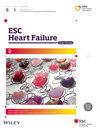Causal correlations between inflammatory proteins and heart failure: A two-sample Mendelian randomization analysis
Abstract
Aims
Inflammation plays a critical role in both the development and progression of heart failure (HF), which is a leading cause of morbidity and mortality worldwide. However, the causality between specific inflammation-related proteins and HF risk remains unclear. This study aims to investigate the genetically supported causality between inflammatory proteins and HF using a two-sample Mendelian randomization (MR) analysis.
Methods and results
We utilized genome-wide association study (GWAS) data of 91 inflammation-related proteins as exposures from the SCALLOP Consortium (14,824 participants), alongside outcome GWAS summary statistics from FinnGen (29,218 cases/381,838 controls) and HERMES (47,309 cases/930,014 controls) for HF, to conduct a two-sample MR analysis. For each inflammatory protein, instrumental variables (IVs) were chosen following the three foundational assumptions of the MR analysis, requiring a minimum of three qualifying single nucleotide polymorphisms (SNPs) each with a P < 5e-8. Associations between inflammatory proteins and HF were assessed through inverse-variance weighted (IVW), MR-Egger regression, weighted median and weighted mode analysis. The reliability and validity of the results were evaluated by examining heterogeneity, horizontal pleiotropy, leave-one-out analysis, meta-analysis and reverse MR analysis. Heterogeneity refers to the variation in results across different genetic variants. Horizontal pleiotropy occurs when a genetic variant influences multiple traits through different biological pathways. Addressing both heterogeneity and horizontal pleiotropy is crucial for ensuring the reliability and interpretability of MR results. Our analysis identified associations between three inflammatory proteins and HF risk. Matrix metalloproteinase-1 (MMP-1) (OR, 1.09; 95% CI, 1.00–1.18; P = 0.04) and TNF-beta (OR, 1.05; 95% CI, 1.01–1.09; P = 0.01) were positively associated with HF risk in FinnGen. In contrast, urokinase-type plasminogen activator (uPA) was inversely associated with HF risk in both FinnGen (OR, 0.85; 95% CI, 0.78–0.92; P = 3.27e-5) and HERMES (OR, 0.93; 95% CI, 0.87–0.99; P = 0.03). No evidence of heterogeneity and horizontal pleiotropy was observed in the MR analysis, indicating the robustness of our findings. A meta-analysis further supported this association, indicating a reduced risk (OR, 0.89; 95% CI, 0.81–0.98; P = 0.02). No reverse causality was found between HF and these three inflammatory proteins (P > 0.05 for all).
Conclusions
This study provides genetically supported evidence of the causal association of specific inflammatory proteins with HF risk. The positive association of MMP-1 and TNF-beta with HF suggests their roles in disease pathogenesis, whereas the inverse association of the uPA indicates its potential protective effect. Our findings highlight the potential of targeting specific inflammatory pathways as a therapeutic strategy for HF.


 求助内容:
求助内容: 应助结果提醒方式:
应助结果提醒方式:


